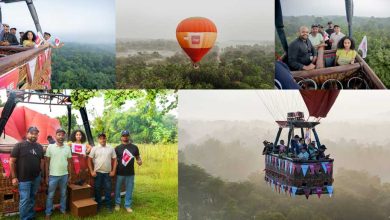THE COMMERCIAL BANK OF CEYLON
ComBank pledges another 100,000 trees to celebrate Water Board’s 50th anniversary
Phase 2 of ‘Trees for Tomorrow’ initiative to focus on water catchment areas
The Commercial Bank of Ceylon has announced a milestone partnership with the National Water Supply and Drainage Board (NWSDB) for the launch of a massive countrywide community-centric programme to plant another 100,000 trees.
This second phase of the Bank’s ‘Trees for Tomorrow’ initiative will focus mainly on water catchments identified as vulnerable due to deforestation, erosion, or human activities, and will result in sequestering approximately 2,000 tons of CO2 annually, while generating other social and economic benefits, the Bank said.
The first phase of Commercial Bank’s ‘Trees for Tomorrow’ programme was launched on 11th November 2023 and resulted in 100,000 trees being planted in just 12 months.
The new project funded by the Commercial Bank will form part of the NWSDB’s 50th anniversary celebrations in 2025. According to the Board, which will be the principal executor of the programme, climate change is altering the hydrological cycle and changing the timing and intensity of rainfall, directly affecting the quantity and quality of water resources for different users.
The planting of another 100,000 trees in catchment areas, the NWSDB says, will ensure the long-term preservation of essential water sources for generations to come.
Speaking at the launch of the programme, Commercial Bank Managing Director/CEO Mr Sanath Manatunge said this initiative underscores the importance of partnerships in addressing challenges such as climate change and resource conservation. “As a bank, we focus on eight Sustainable Development Goals, and this collaboration directly contributes to SDG 13 – Climate Action, SDG 17 – Partnerships for the Goals, as well as SDG 6 – Clean Water and Sanitation and SDG 14 – Life Below Water,” he pointed out.
Emphasising that “At our bank, sustainability is not a standalone effort; sustainability is now a core element of every decision and action we take,” Mr Manatunge said Commercial Bank follows a holistic three-pillar approach to sustainability, integrating Environmental, Social, and Governance (ESG) principles; accountability that encompasses environmental stewardship, resource efficiency, reducing the bank’s footprint and diversity, equity, and inclusion; and building stronger communities by addressing social and environmental needs through meaningful projects and initiatives.
“We are pleased to partner with the National Water Board, where there is the enthusiasm needed to make this initiative a success,” he added. “We are confident that this collaboration will enable us to select the best locations for tree planting, and we will assign those locations to our branch network to ensure its full support and active participation in this project.”
The project will help offset carbon emissions, enhance biodiversity, combat climate change, reduce soil erosion, increase the surface run off due to the development of a sponge layer and increase dry weather flow in rivers and streams. As a result, the use of water treatment chemicals can be reduced, and air and water quality would improve.
The large-scale public engagement envisaged in the programme would, in addition, empower communities, provide education, and improve the quality of life through green spaces and economic trees, and foster partnerships with local communities, school children and organisations for environmental restoration.
The tree planting programme would also generate long-term benefits such as sustainable wood products, fruit harvests, and the promotion of eco-tourism.
Native plants species specific to each identified climate-zone have been identified to develop the spongy layer that will promote long-term ecological benefits, and the project will involve employees of the NWSDB and Commercial Bank, customers, community members, school children, environmental organisations, local and international non-governmental organisations and community-based organisations.
New scientific approaches such as analog forestry which is a system of ecological restoration that focuses on increasing biodiversity by imitating natural forest systems in order to create economically productive and environmentally mature forests will be considered for this programme.
Every tree planted will be mapped and a database including relevant details of each plant such as GPS coordinates, name of location, name of the plant, species type, planted date and height of the plant, will be maintained, the promoters of the project said.
Sri Lanka’s first carbon-neutral bank, Commercial Bank has made sustainability an integral part of every aspect of its operations and supports a wide spectrum of environmental initiatives.
Crowned Sri Lanka’s ‘Green Brand of the Year’ at the 2024 SLIM Brand Excellence Awards, Commercial Bank is the first Sri Lankan bank to be listed among the Top 1000 Banks of the World and has the highest market capitalization in the Banking Sector in the Colombo Stock Exchange (CSE). The Bank is the largest lender to Sri Lanka’s SME sector, and is a leader in digital innovation.
 Commercial Bank Managing Director/CEO Mr Sanath Manatunge and NWSDB General Manager Eng. T. Barathithasan exchange the collaboration agreement in the presence of (from left) the Bank’s Chief Manager – Sustainability, Women’s Banking & CSR Mrs Kamalini Ellawala, AGM Services Mr Chinthaka Dharmasena, DGM Human Resource Management Mr Isuru Tillakawardana, Chief Operating Officer Mr S. Prabagar and the NWSDB’s Addl.GM (Water Reclamation) Eng. Danesh Gunathilaka, Dean of the Faculty of Engineering of the University of Moratuwa Prof. Jagath Manatunge, and NWSDB Addl. GM (Policy & Planning) Eng. N.U.K Ranatunga and Addl.GM (Water Supply Projects) Eng. Ajith Mahathanthila.
Commercial Bank Managing Director/CEO Mr Sanath Manatunge and NWSDB General Manager Eng. T. Barathithasan exchange the collaboration agreement in the presence of (from left) the Bank’s Chief Manager – Sustainability, Women’s Banking & CSR Mrs Kamalini Ellawala, AGM Services Mr Chinthaka Dharmasena, DGM Human Resource Management Mr Isuru Tillakawardana, Chief Operating Officer Mr S. Prabagar and the NWSDB’s Addl.GM (Water Reclamation) Eng. Danesh Gunathilaka, Dean of the Faculty of Engineering of the University of Moratuwa Prof. Jagath Manatunge, and NWSDB Addl. GM (Policy & Planning) Eng. N.U.K Ranatunga and Addl.GM (Water Supply Projects) Eng. Ajith Mahathanthila.






